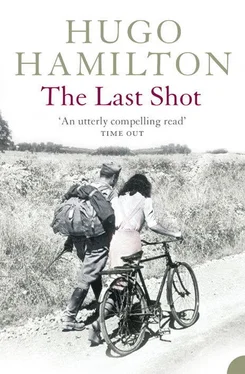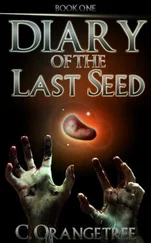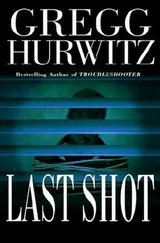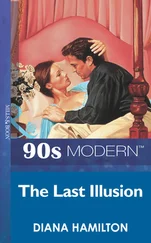Jürgen is not a suspicious man by nature.
He couldn’t be, if he let Anke and myself cycle around Münster on our own for a day. If he never asked any questions about our crash, then he would hardly start probing now about our cycle tour in the country. When he came home from his practice that evening, he said very little. He asked if we had had a good day. Anke kissed him. But as soon as Jürgen went into the kitchen he found something to complain about. It’s often like that; when people raise a small insignificant issue, blowing it completely out of proportion, they must really be getting at something else. Maybe he was suspicious.
He started giving out stink to Anke about the tiny silver jug she had stolen from the cafe during the day. His tirade could be heard in a sort of elevated whisper from the kitchen where Anke worked to prepare a meal. He had found the jug on the window sill. He knew it was new. It almost seemed as though he knew about it before he got back.
Funny, too, that Anke didn’t defend herself at all. As though she was admitting far more than just the jug. By saying nothing, she declared herself guilty to another, under-the-surface, truth. She just hovered around the kitchen avoiding Jürgen’s questions. I heard a pepper-mill grinding.
‘Jürgen, come on! It’s only a jug,’ she said,
‘But that’s just it, Anke. It’s not just a jug. I thought we agreed about this?’
Anke didn’t reply. She began to increase the volume of kitchen clatter by a small but noticeable margin. Jürgen brooded.
Maybe I wasn’t meant to hear all this. I was in the living-room with Alexander, who was pointing at the window, trying to show me something. He kept saying something I couldn’t understand – you know the way it is when you try too hard-something like ‘Flee, flee.’ I nodded repeatedly and kept saying yes, thinking he was just pointing out of the window or at the window, getting excited about nothing. It was a while before I realized he was pointing at a fly going up the side of the window, hidden from my view at first. I stood up and watched the fly with him. Then he was happy.
I lifted him up to look at the fly more closely. Instead of looking at the fly, Alex began to look at my face, examining my ears, nose, hair, without uttering a sound. When I put him down again he began to jump up and down with excitement. Then he ran around in circles.
I felt I was getting closer to Alex. He was getting to know me.
Outside, Anke and Jürgen were still silently battling it out over the jug. She was laying the table for the meal, saying nothing. She asked him to help. He began to open and close the fridge, endlessly appealing for reasons; making up explanations. ‘What is this innate urge you have to steal? Is it that you want to remember the café? What is it?’ Maybe he had discovered that the jug had become more than a simple ornament to Anke, some kind of symbol or memory of somewhere else, Düsseldorf; events in her life he had not witnessed himself.
Anke reminded him that they had a guest.
Jürgen came in and sat beside me. Alex ran over and threw his arms around his leg. Jürgen took Alexander’s face in both hands and kissed him on the head, quietly, regally. Alex did more gymnastics in the centre of the room until he slipped on the edge of the carpet and fell. ‘Oooh…’ he said, and then smiled at us.
I don’t know how Jürgen could possibly have known what happened between Anke and myself. I felt he must have followed us around all day, into the woods of Münster. He seemed far too good-humoured all of a sudden. He asked how the day went.
‘Fine,’ I said. That’s a lovely bike you have.’
Jürgen raised his palms in a grand gesture of hospitality. It’s all yours, he was saying. Any time.
‘You shouldn’t let her take things like that,’ he said, after a pause, bringing up the subject of the jug once again in a more lighthearted way. ‘She’s a notorious thief. I can’t stop her.’
I felt uncomfortable with Jürgen sitting beside me. Again, he began to offer me his boundless hospitality, saying he would teach me hang-gliding; we could go flying, all three of us, or horse-riding – if only I stayed till Saturday.
Jürgen talked about the events in Germany. The news was beginning to speed up. Germany was moving faster than they could print newspapers. Unity was on the way.
‘It’s an exciting time for Germany,’ he said.
What did he mean by that? I began to read things in his mind that were not there.
All evening, Anke and I behaved as though nothing had happened. How can you behave as though nothing has happened? It seemed as though everything was staged, completely rehearsed and unnatural. Every movement seemed deliberate. If I passed the salt to Anke at the table, I had to do it with less enthusiasm than usual. If she offered the bowl of sliced potatoes, she was doing it with general manners, nothing more. If anything, Anke was ignoring me a little too much, leaning a little too much towards Jürgen.
Everything seemed false. Whenever Anke asked me a question, it seemed as though she was not really interested in having it answered, just in showing that I was still a stranger, still a visitor, and still a friend of the family. We were bending over backwards to show the world, Jürgen at least, that we were not lovers, never had been, never would be.
She asked me things I had told her during the day already. She still wanted to appear as though there were things about me she didn’t know. A normal interest.
Alexander was the only source of real distraction. While Jürgen fed him slowly, Alex shook his head, sometimes losing or scattering the food which Jürgen had just placed in his mouth. Jürgen was so patient. He kept telling Alex that shaking his head was impractical. I never saw Jürgen get angry with him. He couldn’t. When Alex began to put things on his head, we all laughed out loud together. Alex’s blue fork fell off the table.
Then Alex began to look underneath the table. He was making life difficult for Jürgen but easy for us. Jürgen chased him around with a spoon.
It is impossible to hide. And it’s impossible to act like nothing happened. You have a need to tell. Maybe Anke thought it was better to come clean and bring it all out in the open.
‘On the way home, we were caught in the rain,’ Anke said. It gave me a start to hear her say it. ‘We got soaked. I’ve never got so wet in all my life. There was nowhere to shelter, anywhere.’
Jürgen didn’t seem to hear her. He was just bending down under the table to pick up Alexander’s fork from the floor. Anke looked over at me. She shrugged. I was waiting for Jürgen to come up again and look into my eyes but he seemed to stay down there. Alex went under the table with him.
Anke pursed her lips and sent me a long, glorious kiss across the table. Then she got up to make the coffee.
The strain of secrecy makes you want to blow everything; tell all, never mind the consequence. Why conceal what’s on your mind? Telling makes you honest.
I have always wanted to ask Anke why she married Jürgen. Why she said nothing to me at the time. I always wanted to tell her how much it killed me. But we never discussed that kind of thing. It was as though any analysis would embroil us in something complicated, something tedious. Anything between Anke and myself has always been simple and short.
Once she got married, I had no wish to interfere. I stayed away from them on purpose. But then I found I had shunned the two best friends I’ve ever had.
Anke and I had walked off the red sandy path through the trees until we reached a clearing at the top of a low hill. From the summit we could see the flat countryside all around. The town of Münster lay in the distance on the horizon, like a town in the past, under pillows of dark, fast-moving clouds, the sun occasionally breaking through like orange spotlights. Patches of land were lit up. What is it about landscape that makes you think back, beyond your own past into history? Germany looked ancient. I was thinking timber houses, timber fences, horses and carts, troubadours.
Читать дальше
Конец ознакомительного отрывка
Купить книгу












